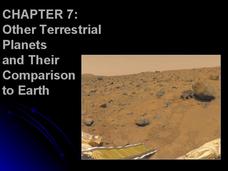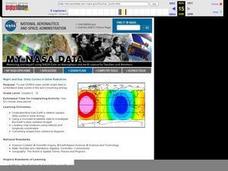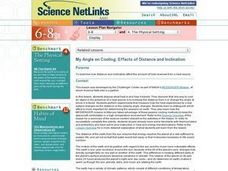K12 Reader
Galileo and His Telescope
Readers are asked to identify how a key detail reveals the main idea of a paragraph about Galileo.
TLS Books
Uranus
After reading an informational text passage, learners answer four multiple choice questions about the third largest planet in our solar system.
Star Date
Solar System Scale Model Demonstration
Explore outer space and decorate your classroom with an astronomy project. Learners create a visual model with the creation of a scaled solar system using different sized balls.
NASA
Touchdown
Individuals design and build a set of shock absorbers to protect their astronauts when they land. Using a limited amount of supplies, pupils build a system that will keep two large marshmallows from flying out of a cup when it lands...
It's About Time
Reflected Light
The lesson allows young scientists to use lasers and mirrors to study reflected light. A reading passage and homework question assess learning, while additional material introduces extension activities.
It's About Time
Communication Through Space
If humans do find aliens, how would we communicate with them? An intriguing lesson walks through some of the challenges associated with this question. How long would a message take to reach a specific destination, what language should we...
Journey Through the Universe
Our Solar System
Take your class on a journey through our solar system. Learners explore each planet, from Mercury to Pluto, and discuss various features that differentiate one from another. They complete activities related to the topics and discuss the...
Laboratory for Atmospheric and Space Physics
Space Travel Guide
Looking to take a trip? Why not go to space? Here, scholars take on the role as travel agent to create a guide to their favorite planet including travel tips and sightseeing recommendations.
University of Colorado
Space Travel Guide
Neptune takes 164.8 Earth years to travel around the sun. In the fifth of 22 lessons, young scientists create a travel guide to a planet in our solar system. They provide tips for others on what to bring, what they see, and their...
University of Colorado
Using Spectral Data to Explore Saturn and Titan
Saturn's rings are made of dust, ice, and solid chunks of material. Individuals use spectrographs in this final installment of 22 lessons to determine the atmospheric elements. They analyze spectrums from Titan's atmosphere and Saturn's...
Florida International University
The Good, the Bad and the Nasty Tasting
Examine the benefits of chemical defense mechanisms. Organisms in oceans use chemicals to ward off predators. Duplicate this adaptation using a hands-on experiment in which you ward off your predators (your pupils) with some bad-tasting...
Nosapo
Dictionary
Brush up on those dictionary skills with a simple learning exercise that has pupils looking up words in a dictionary, writing the definition, and using the words in a sentence.
Glynn County School System
Terrestrial Planets
Mercury, Venus, Earth, and Mars are collectively known as the terrestrial planets. Although part of the same group, each planet has its own set of characteristics. Scholars explore the characteristics that make the planets unique and...
Glynn County School System
The Outer Planets
Are outer planets just like inner planets? Nope! The outer planets are much more spread apart than the inner planets. An informative PowerPoint presentation shows why this is true as well as facts about the individual planets in the...
Glynn County School System
Light, History, Gravity, Distance, Relativity, and Space-Time
Let the star's color be the guide! The color of a star indicates its temperature and its mass and distance affect the gravitational force. The lesson presentations address these concepts as well as how the theory of special relativity...
Discovery Education
Solar System Scale
Extremely large or extremely small numbers are difficult to comprehend. To help understand the massive scale of the solar system, learners complete two activities. First, they create a model to compares the size of the bodies in the...
Curated OER
Responding to Literature: James and the Giant Peach
Fifth grade reader/writers create an alternate ending to an episode in Roald Dahl's James and the Giant Peach in which our protagonist "loses" the chance to magically solve all his problems. Prompts students not only to write creatively...
Curated OER
Comet Myths, Facts, and Legends
Here is an interactive book activity through which learners explore the facts and stories about comets. The plan is comprehensive, providing background information, standards met, vocabulary, assessment ideas, and more. Though the...
Curated OER
A Study of Warm And Cool Colors
Second graders create a multimedia painting using warm or cool colors expressively. They demonstrate multimedia techniques in a drawing using pencil, oil pastel and tempera paints. They recognize and discuss mood created by warm and cool...
Curated OER
NIGHT AND DAY: DAILY CYCLES IN SOLAR RADIATION
High schoolers examine how Earth's rotation causes daily cycles in solar energy using a microset of satellite data to investigate the Earth's daily radiation budget and locating map locations using latitude and longitude coordinates.
Curated OER
My Angle on Cooling: Effects of Distance and Inclination
Students discuss what heat is and how it travels. They discover that one way to cool an object in the presence of a heat source is to increase the distance from it or change the angle at which it is faced.
Curated OER
Whose Point of View? The Journey of Three Generations
A reading of Whale Journey, a fact-filled picture book by Vivian French, launches a study of the life cycle and migration of three generations of gray whales. The interdisciplinary instructional activity offers opportunities extensions...
Curated OER
Weather Jeopardy
Fourth graders review weather terms by playing a game of Weather Jeopardy.
Curated OER
Flag Day
Students describe the symbolism, tradition, honor and power that flags bear and explore the stories of Civil War battle flags.
Other popular searches
- Walk Two Moons
- Moons Gravity
- Moons Craters
- Walk Two Moons Foreshadowing
- Walk Two Moons Novel
- Walk Two Moons Questions
- Moons, Comets, Asteroids
- Moon's Phase and Position
- Character Walk Two Moons
- Stars and Moons
- 15 Moons of Uranus
- Moons Surface and Structure

























